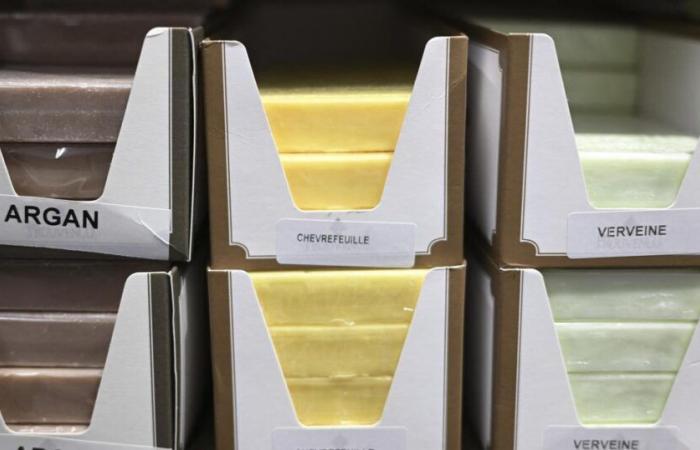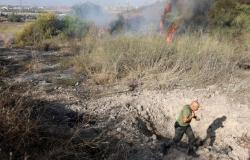The few soap artisans who operate in Marseille face very strong national and international competition, due to the absence of a protected geographical indication guaranteeing the authenticity of the soap.
The Figaro Marseille
The small cube is blooming in all the shops around the Old Port of Marseille, as if to better remind us that it has been the glory of the Phocaean city for decades. It is the flagship souvenir that tourists bring back in their suitcases to keep with them a piece of the second city of France. But, even if it is engraved «Savon from Marseilles»there should be no mistake. “These are even the best places to find fake Marseille soap”regrets Julie Bousquet-Fabre, president of the Marius Fabre soap factory and of the Marseille soap professionals’ union (UPSM).
For several months, a worrying figure has been circulating in the press. Nearly 80% of the world’s production of Marseille soap is not from Marseille. An estimate that would even be optimistic according to professionals in the sector in Bouches-du-Rhône. “We don’t have the precise data, but I think that if you have fun doing the math, it may even be much more than that, estimates Julie Bousquet-Fabre. The majority of Marseille soaps are not from Marseille. They do not correspond to the process, composition and geographical origin of real Marseille soap, because any manufacturer can mark Marseille soap on their product.
“Türkiye, Morocco… Everyone makes Marseille soap”notes Serge Bruna, master soap maker at the Savonnerie de la Licorne and president of the Association of Marseille Soap Manufacturers (AFSM). It must be said that Marseille soap is a small windfall, which attracts customers all over the world. “Before Covid, I had a seller in China who sold my soap for 18 euros, knowing that it is sold for a little more than two euros in France”remembers Serge Bruna. “Our La Corvette soap brand is sold in around thirty countries around the world” reports Guillaume Fievet, general manager of the Savonnerie du Midi.
David vs Goliath
“In France, including the L’Atlantique soap factory, it is estimated that artisan soap makers produce 30,000 tonnes of soap per year.”calculates Serge Bruna, who says he exports to Japan, Canada and Taiwan. To this figure must be added the many “Marseille soaps” which manufacturers like the giant Henkel sell as such.
But we are a long way from the green cube made from olive oil as produced by soap factories at the height of this typically Provençal industry, when Marseille supplied half of the world’s soap consumption at the beginning of the 20th century.e century. And for good reason: no protected geographical indication allows us to know the origin and authenticity of a Marseille soap. If the traditional recipe – as regulated by the edict of Colbert in 1688 – includes five main stages according to very precise ingredients, the composition and the manufacturing process actually differ greatly from one product to another. To cite just one example, instead of olive oil, so-called Marseille soaps contain animal fats.
“So there is a topic around cost, notes Raphaël Seghin, president of the Fer à Cheval soap factory. Soaps that are not real Marseille soaps are cheaper. When you manufacture in France, you have incompressible costs. However, when a customer does not understand the difference, he necessarily buys the cheaper one. “Some people sell soaps at prices lower than the price at which the raw materials are purchased.”sighs Serge Bruna. “Saponification based on vegetable oil must also be recognized as being linked to specific know-how”Guillaume Fievet also claims. “It’s the jungle, a bit like David versus Goliath”summarizes Julie Bousquet-Fabre.
Arm wrestling over the IGP
The Protected Geographical Indication (PGI) project has been on the table for almost fifteen years. “There are also economic interests behind it”acknowledges Julie Bousquet-Fabre. But the project also, and perhaps above all, ran into a squabble between Marseille soap makers, embodied by two long-rival producers’ associations, each of which had a PGI application. “Everyone is convinced that they have the right definition of Marseille soap and no one wanted to give up.”summarizes Serge Bruna. Produce in Marseille, in the Bouches-du-Rhône department or in the region? Manufacture from A to Z or package imported soap shavings? With or without perfume? So many questions that have torn the small world of soap makers apart.
Like an outstretched hand, Serge Bruna says he is inclined to make concessions. “One of our members is in Toulon, but we are ready to sacrifice the regional level to concentrate on Bouches-du-Rhône”confides the master soap maker of the Licorne. The gesture is received coolly by the soap makers of the UPSM, who claim to be the only ones in the Bouches-du-Rhône to manufacture raw material up to its transformation into Marseille soap.
“We can’t find an agreement, so we need an independent arbitrator so we can choose and block things.”demands Raphaël Seghin. Eyes are now turned towards the future Minister of the Economy. “Political will is needed, but I don’t think this issue will be the priority of the next government.”smiles Julie Bousquet-Fabre. In the meantime, the four members of the UPSM have developed a label to distinguish the 500 to 700 tons of soap that these Provençal companies produce each year.






